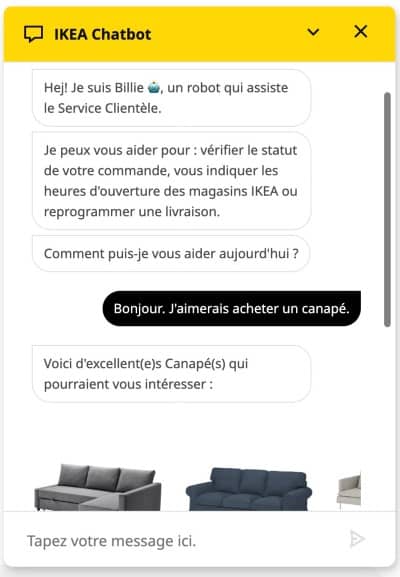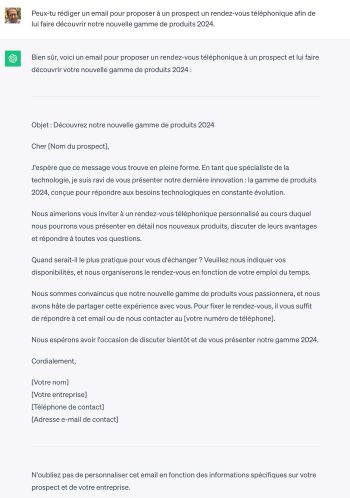Artificial intelligence (AI) is not designed to replace salespeople... but it can help them to improve their performance. The "augmented salesperson" will then have effective tools at his or her disposal to target, qualify and interact with prospects. So how can AI have a positive impact on sales strategies? How can AI help salespeople to be more effective? Here are some answers from Philippe Nieuwbourg, a business expert in the field of data, specialising in governance of information and in getting companies to embrace new technologies such as artificial intelligence.

Just imagine that every Monday, an artificial intelligence system prepares a personalised, qualified list of the ten prospects most likely to sign a new contract during the week! That's what AI applied to the sales process will enable tomorrow. It's not a miracle, it's forecasting.
Anticipating needs through predictive analysis and data collection
A sales strategy starts with collecting data, on social media, your e-mails, from your partners, etc. In fact, Amazon tells us that they start delivering a product before you've even ordered it!
Numbers, dates, but also texts, images, "likes", comments... This data represents what is commonly known as Big Data. In other words, the gigantic volumes of traces that we all leave behind as we surf the Internet, use our mobile phones or connect our devices.
This data will be grouped together automatically in large databases. These are known as data warehouses or data lakes. And that's where AI comes in.
Using AI to automatically identify and qualify prospects
AI sorts, groups, simplifies, synthesises and connects all this information, and deduces predictable behaviour from it.
So we're predictable? If you go to a travel website to look at mountain holidays, and on the same day go to a sales website to look for a rucksack. At the same time, you post a question in a Facebook group about the weather in Switzerland at the end of the year. The AI will be able to create a link between these pieces of information and deduce that you would like to spend your next holiday in the mountains in Switzerland.
You don't realise it, but your actions have been connected. The AI deduces that it's probably time to present you with offers for holidays in Austria (another interesting European country for mountain holidays), and perhaps for ski equipment.
Now, if you're on the sales side, imagine targeting: you're selling mountain holidays and you're given a list of people who have carried out this type of search. AI becomes your best sales assistant.
Qualifying customer needs using chatbots and automated tools
Once the prospects have been identified, they need to be contacted. There is no substitute for human contact and salesmanship. But to allow as much time as possible for this human interaction, you need to prepare for it. Chatbot and automated e-mail dialogue tools will help you qualify the customer's needs, understand their constraints and set up your sales meeting.
At Walmart, theGenerative AI is used to sell clothes. Integrated into a virtual fitting application, it allows customers to take photos of themselves and then try on clothes by recreating the shadows and folds of the fabric. According to the retailer, it has reduced the return rate for items ordered by 30 %.
A conversational agent to split you up!
A chatbot, a conversational agent is a system that will talk to your prospect, giving him the impression of being connected to a human being, rather than a machine. The prospect asks questions. The conversational agent studies their request, asks them any additional targeting questions and provides them with answers... without forgetting to memorise their entire approach, in order to better determine their profile.

The most efficient of these virtual agents can even discreetly hand over to you. You then resume the conversation, focusing on the most important prospects, and let the AI handle the others. They won't even notice!
Example: a financial services company set up an intelligent chatbot on its website. This chatbot was able to instantly answer prospects' common questions, help fill in online forms and even schedule appointments with financial advisors. Prospects found the experience more convenient, which increased the conversion of prospects into customers.
ChatGPT to automate administrative tasks
Once you've done your sales work, there's the tedious business of contracting. And your internal procedures require the production of a number of commercial and legal documents. Generative artificial intelligence will take care of drafting a large number of contracts and appendices. Of course, you will still have to personalise them and adapt them to your customer's requirements, but most of the work will have been taken care of by your augmented intelligence.
Example: a logistics company used generative AI to automate the creation of personalised quotes for its customers. By analysing the company's data and the customer's needs, the AI generated detailed proposals, saving sales staff valuable time and increasing the number of contracts signed.
Generative AI, as its name suggests, knows how to create documents, presentations and images. To be more precise, it can copy. In other words, it will learn from all your existing presentations and contracts, and draw inspiration from them to create new documents. It will therefore be able to draft a proposal for a new customer, based on existing contracts, but adapting them to the characteristics of the new customer, which it will have collected in its big data.
At Carrefour, Hopla is now at the service of the customer, powered by generative AI. It analyses individual food preferences, then generates shopping lists, suggests recipes and creates shopping baskets. It takes into account the customer's budget and favours seasonal foods.
At Mondial Tissu, generative AI is used to prepare the product catalogue. Coupled with a PIM (Product Information Management) system, ChatGPT is used to create descriptions tailored to different markets and customer profiles.

So AI will have saved you a lot of time. But beware: it's still best to proofread the contract carefully before sending it to the customer. Even generative AIs can make mistakes!
AI, your best ally
Artificial intelligence is therefore an opportunity to improve your sales strategy and be more effective.. Provided, of course, that you see it as an ally, not a competitor.
Around these three stages, the profile of the " increased business ". The human salesperson will not be replaced. They will be assisted in their work by various forms of AI, based on data collected from multiple sources. This will always be done in compliance with data protection regulations. personal data (RGPD).
Easy, you might ask? No, because there are many pitfalls. Customers could misinterpret this automatically-generated content if they were aware of it. And if the data collected is of poor quality, your entire customer portfolio could suffer. So don't be too quick to jump on these tools without understanding them.
Successfully integrating AI into your sales strategy therefore requires training, support and in-depth knowledge of data-related technologies.
Amazon, an emblematic example of the successful integration of AI into its sales strategy
Amazon has used artificial intelligence to improve both the customer experience and the efficiency of its operations.
Product Recommendations
One of the most visible examples is Amazon's product recommendation system. AI analyses customers' shopping habits, items viewed, reviews and other data to recommend relevant products. This personalisation of recommendations has led to a significant increase in sales, as customers are more inclined to buy items that really interest them.
Demand forecasts
Amazon uses AI to anticipate product demand. By analysing historical and real-time data, Amazon can adjust its inventory and logistics operations to meet demand, minimising stock-outs and maximising supply chain efficiency.
Customer support
Amazon has also integrated AI into its customer service. Amazon's chatbots can answer many common customer questions, providing fast and efficient assistance. This reduces the workload of customer service staff and enables a quicker response to customer queries.
In-store experience
Even in its physical shops, such as Amazon Go, AI is playing a key role. role key. AI-based sensors and cameras are used to track customers' movements and the items they remove from the shelves, enabling automated payment without a cashier.
These examples show how Amazon has successfully leveraged AI to improve the efficiency of its operations, personalise the customer experience and increase sales. Amazon has become a global leader in online retail thanks to its ability to leverage AI in almost every aspect of its sales operations.
The bottom line: AI does represent a significant asset for salespeople. While it is not intended to replace them, it can help them to improve their performance, from identifying prospects to automating administrative tasks. But it is essential to understand its limits and to ensure that the data collected is of high quality.





